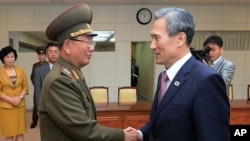The inter-Korean agreement to end a military standoff over land mine blasts that maimed two South Korean soldiers shows North Korea’s vulnerability to outside criticisms, U.S. experts say.
The two Koreas reached the deal early Tuesday after more than 43 hours of intensive talks. In the agreement, North Korea expressed regret over its aggression against South Korea, a complete reversal of its previous position.
“The north side expressed regret over the recent mine explosion that occurred in the south side’s area of the Demilitarized Zone along the Military Demarcation Line, wounding soldiers of the south side,” said North Korea’s state-run Korean Central News Agency.
In return, South Korea agreed to stop loudspeaker broadcasts across the DMZ.
Victor Cha, a Korea analyst at the Center for Strategic and International Studies (CSIS), said the deal revealed Pyongyang’s strong desire to stop the propaganda campaigns.
“I think it really speaks [to] how badly they really wanted those broadcasts to stop,” said Cha. "One gets a sense that they were really in urgency to stop the broadcasting because they are very sensitive about the legitimacy of the leadership right now,” Cha added, referring to Kim Jung Un’s rise to power.
Some experts view the deal as an outcome of Seoul’s tough stance on Pyongyang’s aggressions. South Korean President Park Geun-hye demanded an apology from North Korea while top security officials from the two sides were trying to finalize the deal.
Ralph Cossa, president of the Pacific Forum CSIS in Honolulu, said South Korea’s patience with North Korea has worn thin after Pyongyang’s series of provocations, in reference to North Korea’s alleged attack on South Korea’s navy ship and shelling of a South Korean island, resulting in the deaths of 50 people.
“South Korea just said we are not taking this anymore. They are playing hardball with them [North Koreans], and I think essentially the North Koreans blinked,” said Cossa.
Some say the agreement serves both side’s interests.
“I think it is a win-win. North Korea has gotten the attention of the South, which has perhaps opened the door to some modest steps at rapprochement. The South has remained resolute in the North Korean aggression, and has not provided one-way concessions to the North in order to try to convince the North to behave better,” said Frank Jannuzi, president of the Mansfield Foundation, a nonprofit that advocates for better U.S.-Asia understanding and cooperation.
Under the inter-Korean agreement, the two Koreas will hold government-to-government talks at the earliest possible date. The agreement also calls for reunions of separated families to be resumed in time for Chuseok, Korea’s annual harvest holiday, which begins in late September.
The two sides have been at odds over the land mine attack since August 10, when the South accused the North of planting land mines in the southern part of the DMZ. South Korea had called on North Korea to apologize for the attack, but the North has denied its involvement in the attack. As part of a retaliatory action against Pyongyang, Seoul had resumed loudspeaker broadcasts towards Pyongyang for the first time in 11 years, drawing strong protests from Pyongyang.









